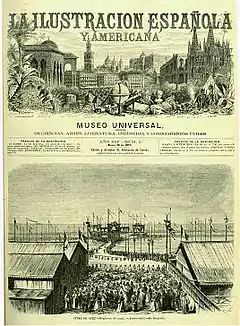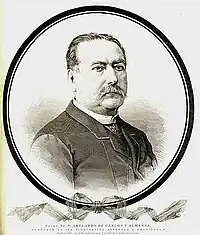 Cover from January, 1870 | |
| Frequency | Weekly |
|---|---|
| Founded | 1869 |
| Final issue | 1921 |
| Country | Spain |
| Based in | Madrid |
| Language | Spanish |
| ISSN | 1889-8394 |
La Ilustración Española y Americana was a weekly Spanish magazine that was published from 1869 to 1921 on the 8th, 15th, 22nd and 30th of every month. It was also published biweekly.[1]
History
The magazine was a continuation of El Museo Universal, which was published from 1857 to 1869,[1] and was modeled after prestigious European publications such as L'Illustration and Le Monde Illustré in France, the Illustrirte Zeitung in Germany, and L'Illustrazione Italiana.
On its masthead, it was described as a magazine of "sciences, arts, literature, trade and useful knowledge". It was founded in 1869 in Madrid by Abelardo de Carlos, a writer and entrepreneur who had previously published two other magazines (La Revista Médica and La Moda Elegante e Ilustrada). Three years later, the building where it was printed collapsed, killing three people, so Carlos rebuilt with a new, state-of-the-art press. He served as the magazine's Director until 1881, when management passed to his sons Abelardo and Isidro, and he died in 1884.
Among the major writers who made contributions may be numbered José Zorrilla, Ramón de Campoamor, Juan Valera, Leopoldo Alas, Ramón del Valle-Inclán and Miguel de Unamuno.[2] It was also one of the vehicles favoured by Emilia Pardo Bazán for the publication of her short stories, in particular between 1909 and 1913.[3] Regular political and journalistic contributors included Emilio Castelar and Manuel Cañete.
Contents

As its name would indicate, it was profusely illustrated with scenes from daily life in Spain and Hispanic America, where it was also distributed. It became an "authentic school for masters of the graphic arts". Bernardo Rico y Ortega, an engraver and brother of the painter, Martín Rico, was the Artistic Director; responsible for the magazine's design and printing.
The variety of themes encouraged specialization among the magazine's artistic contributors, such as Josep Lluís Pellicer who, like the later photojournalists of the 20th century, produced first-hand scenes from the Third Carlist War and the Russo-Turkish War. It included also the Restoration,[4] costumbrism[5] and realism.[6]
The long list of regular illustrators included the painters Alejandro Ferrant, Enrique Simonet and Valeriano Bécquer, and humorous cartoonists such as Francisco Ortego Vereda. Also notable were engravings based on images by the French-born photographer Jean Laurent.[7]
References
- 1 2 Lou Charnon-Deutsch (2008). Hold That Pose: Visual Culture in the Late Nineteenth-Century Spanish Periodical. Pennsylvania State University Press.
- ↑ Miguel B. Márquez, Abelardo de Carlos y "La Ilustración Española y Americana", from Ámbitos #13-14 (2005), ISSN 1139-1979 online
- ↑ Fernández Cubas, Cristina (2017). Emilia Pardo Bazán. Ediciones Omega. ISBN 978-84-282-1240-3.
- ↑ Trenc, Eliseu (1996). La prensa ilustrada en España: las "Ilustraciones", 1850-1920. Montpellier. p. 350. ISBN 9782905397942.
{{cite book}}: CS1 maint: location missing publisher (link) - ↑ Bermúdez, Lola; Giné, Marta; Hibbs, Solange (2010). Traducción y cultura: La literatura traducida en la prensa hispánica (1868-98) (in Spanish). Peter Lang. p. 148. ISBN 9783034303668.
- ↑ Bozal, Valeriano (1979). Corazón, Alberto (ed.). La ilustración gráfica del XIX en España (in Spanish). Madrid. p. 234. ISBN 9788470532146.
{{cite book}}: CS1 maint: location missing publisher (link) - ↑ Jesús María Sanchidrián Gallego, Ávila romántica: Ávila monumental, artística y pintoresca en la fotografía de J. Laurent (1864-1886). Piedra Caballera. ISBN 978-84-613-5859-5.
Further reading
- Esperanza Cobos Castro, La poesía francesa en la Ilustración española y americana, self-published (1982)
- Blas Sierra de la Calle, Filipinas 1870-1898: imágenes de la ilustración española y americana, Caja España, 1998 ISBN 84-8773-966-0
External links
- Digitalized copies @ the Biblioteca Nacional de España.
- Biblioteca Virtual Miguel de Cervantes: La Ilustración Española y Americana digitalized (1869–1901)
- Articles from La Ilustración Española y Americana digitalized as ePubs, by Ganso y Pulpo
- Antonio Ayuso Pérez. "La Ilustración Española y Americana ante el Tercer Centenario del Quijote" @ the Universidad Complutense.